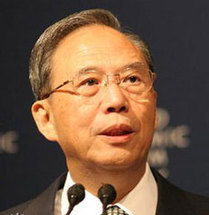Quotes
Uncertainties linger amid recovering world – ex Chinese vice premier
(Xinhua)
Updated: 2010-04-08 23:39
 |
Large Medium Small |
BOAO, Hainan - The global economy still faces uncertainties on its road to recovery despite some improved conditions, former Chinese Vice Premier Zeng Peiyan has said.
|
 Zeng Peiyan |
Unemployment rates in the developed countries were still high while consumer demand and business investment there remained weak, Zeng, vice chairman of board of directors of the Boao Forum for Asia (BFA), wrote in the official publication for the BFA's annual meeting which will open on Saturday.
In addition, some countries in the Middle East and Europe such as Greece were hit by debt crisis and many more faced large fiscal deficits, Zeng said.
The downturn's impact on the global financial system is still quite substantial, and climate change, trade protectionism and other international problems remain, he said.
"Unless these issues are resolved, the global economic recovery will have to travel a long and difficult road," Zeng warned.
The BFA, a pan-Asian platform of dialogue for key issues affecting Asia and the world, will convene its annual session on April 9-11 in Boao, a scenic town in south China's island province of Hainan.
Zeng said the once strong support for international cooperation appeared to be eroding as the financial crisis subsides, which is "even more worrying."
Some nations were verbally against protectionism, but they in fact imposed anti-dumping or anti-subsidy measures and made a fuss about exchange rate problems, Zeng noted.
China's massive economic stimulus and surge in bank lending last year helped to avert an economic downturn, but they also resulted into excess capacity and fuelled inflation expectations, he said.
China should transform the pattern of economic growth by boosting consumer demand and pushing forward pricing reforms of energy resource products in a bid to maintain a stable and relative fast growth in the long term, Zeng said.
Asian countries managed to achieve positive growth last year, but the financial crisis highlighted problems like its excessive reliance on exports and weak domestic demand.
Asia needed to further accelerate development of free trade, strengthen fiscal and financial cooperation, improve its bilateral currency swap agreements, and advance the Chiang Mai Initiative to build a regional foreign exchange pool, Zeng said.
Each Asian economy should also improve its coordination on international issues to create a more favorable business environment, he added.
The forum of political leaders, business people and academic scholars from across the world are expected to hold discussions under the theme of "Green recovery: Asia's realistic choice for sustainable growth" at the coming weekend.







